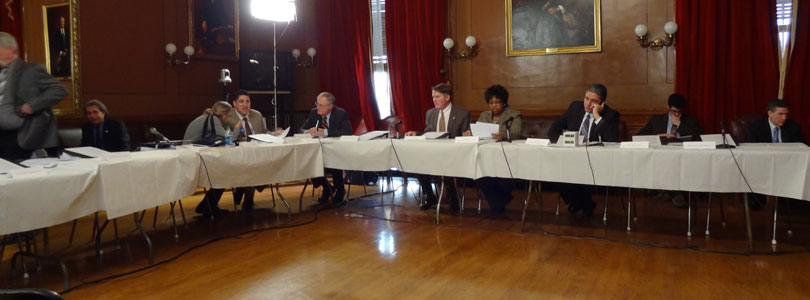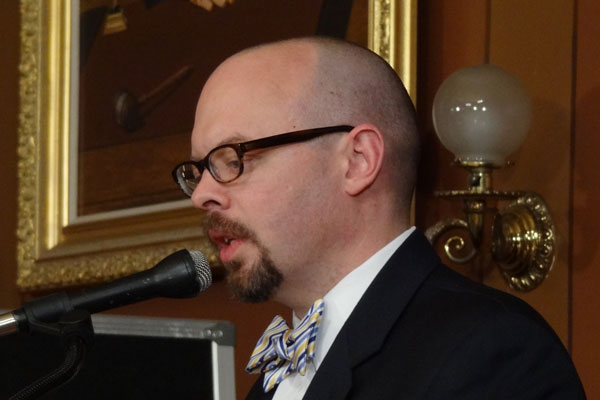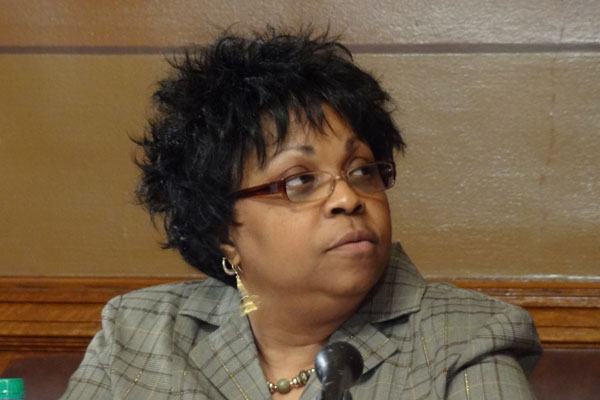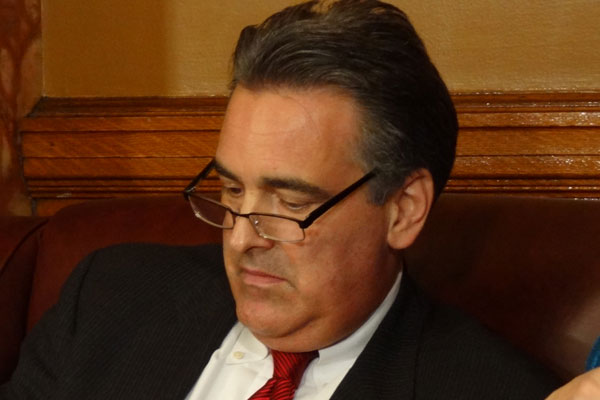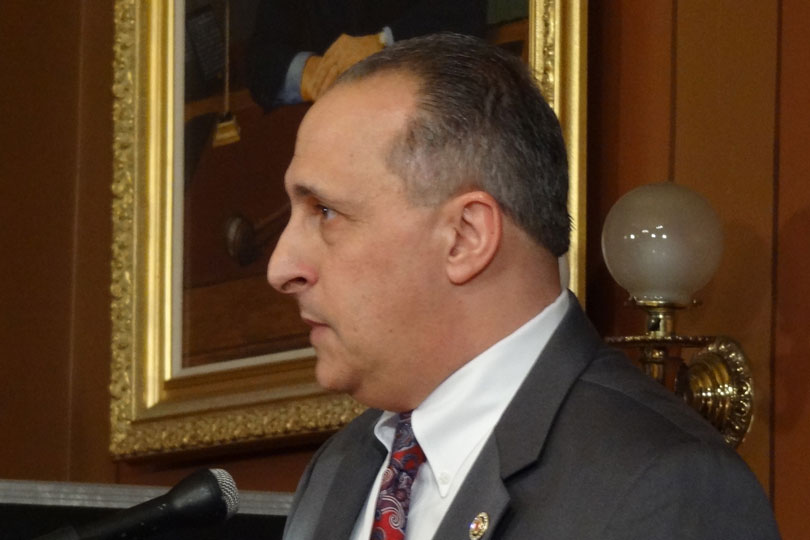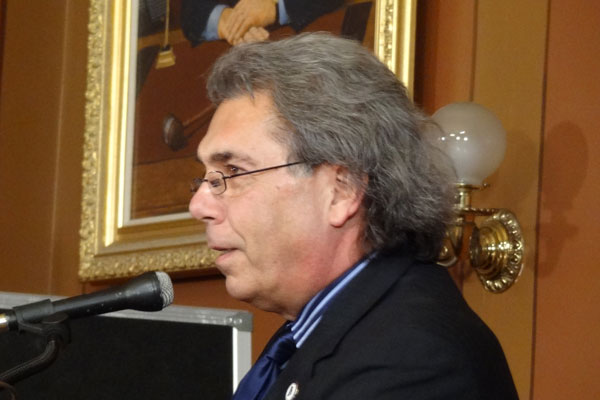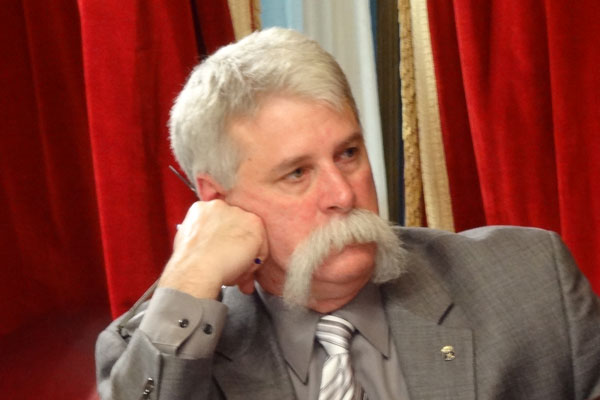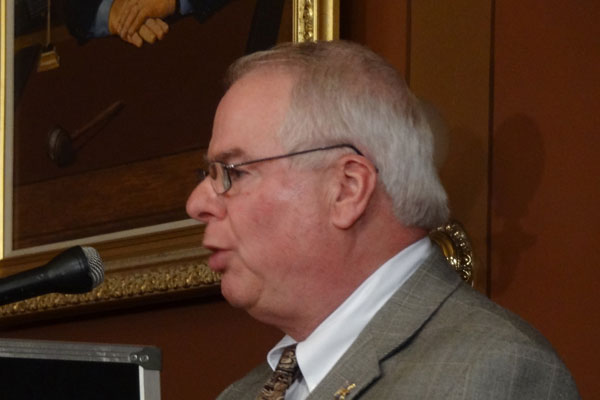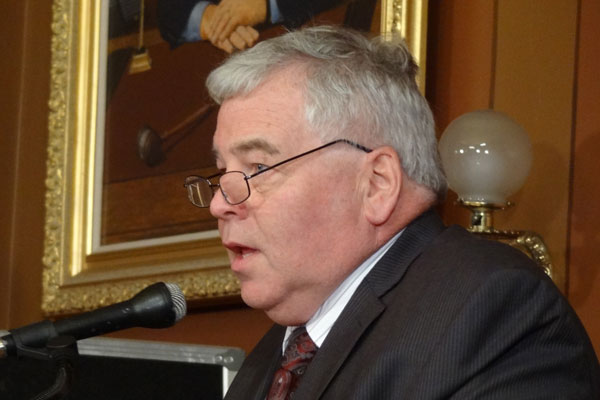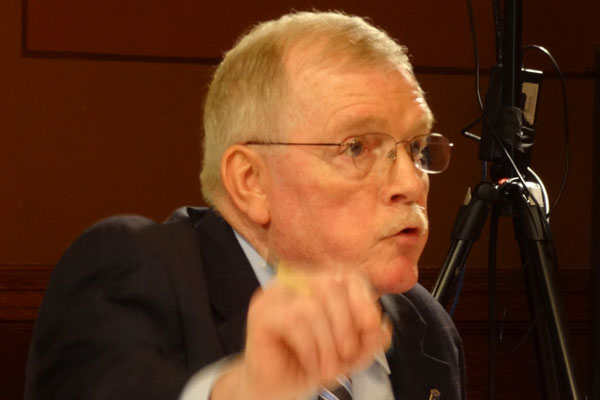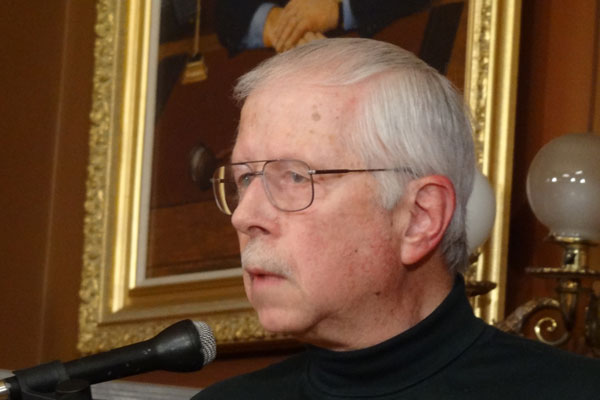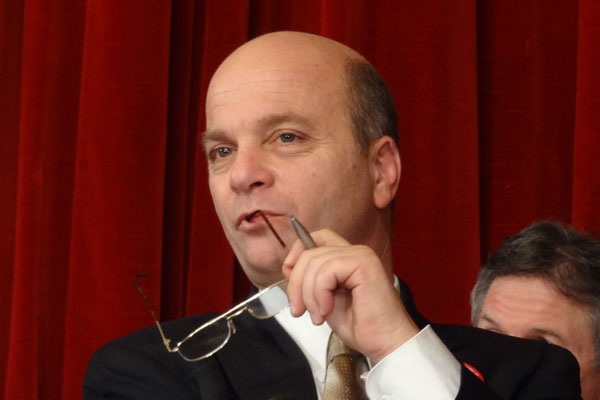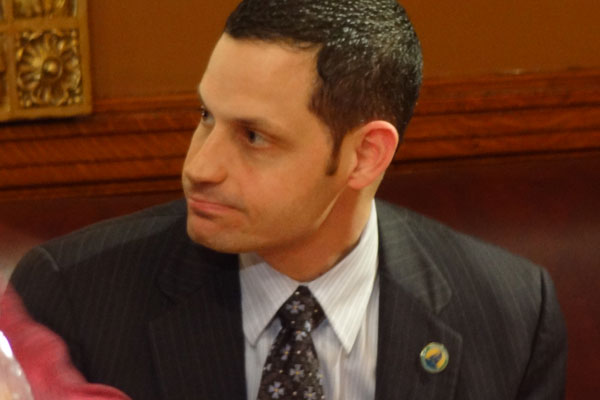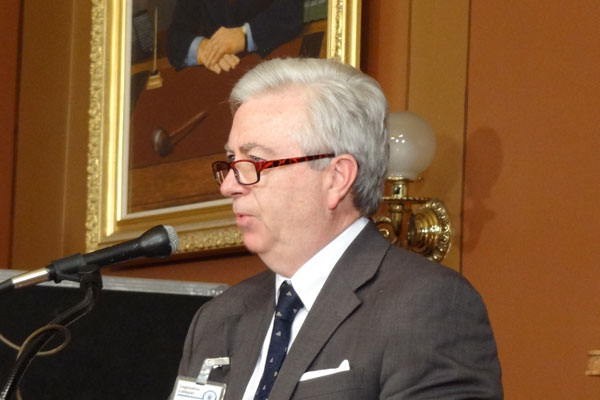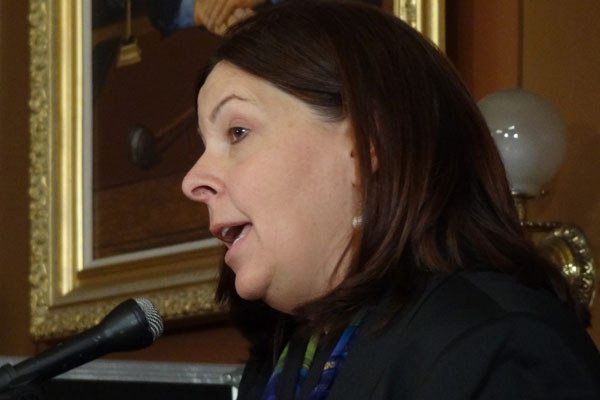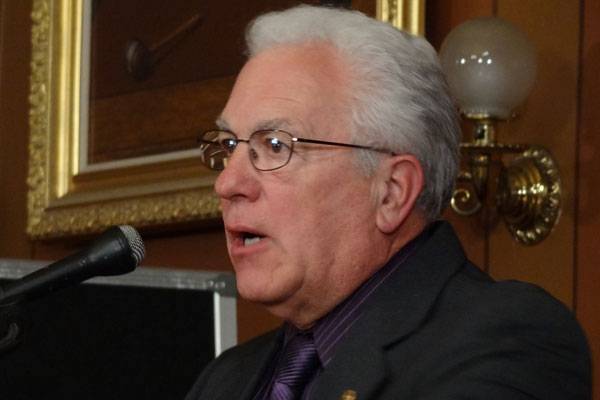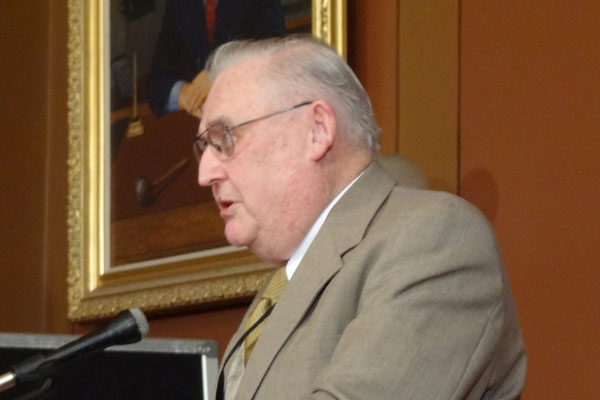03/08/12 – RI House Labor Committee Hearing
4:25 p.m.
I’ve used my mysterious press powers to get an early seat in the House Lounge for the committee hearing. The agenda includes, most notably, 7617, “school employee arbitration.” The rest of the agenda is filled with variations on everlasting contracts.
A few moments ago, when somebody opened the door to the hallway, I saw the NEA’s Patrick Crowley preparing, no doubt, to come in and argue his strenuous best that his union members need such legislation to avoid destitution.
RISC’s Harry Staley is also awaiting the hearing.
4:34 p.m.
Through the door to the House chambers, I can hear a legislator saying something about legislation — a resolution of some sort, I think — while the sound of Catholic school children singing “God Bless America” pervades the building.
During a speaking event in the state room for Catholic Schools Day, Senate President Teresa Paiva Weed and House Majority Leader Nicholas Mattiello assured the audience that they would work to remove the provision in Governor Chafee’s budget that would eliminate funding for textbooks and transportation to private schools.
4:54 p.m.
It’s kind of an awkward setting, in here. The committee members are all sitting along a L-shaped run of tables on the far side of the room. Across from them, some plastic chairs are set up. I chose the seat because of view, but Jim Baron of the Pawtucket Times sat down in one as well, so I guess it’s the press pool. Then, around the outside of the room, in the comfy chairs, are all the lobbyists and union-exec regulars.
And we’re underway.
4:58 p.m.
Rep. John Edwards moved to hold the bills for “further consideration.” No opposition.
4:59 p.m.
Patrick Crowley is first. They’re starting with 7618, which is continual contracts for firefighters. NEA supports “wholeheartedly.”
While beginning the hearing, Chairwoman Anastasia Williams referred to the expected length of the hearing and requested that speakers who are repeating what has already been said just say “ditto.”
City of Providence representative (can’t remember his name, but it sounded like Williams called him Mr. Paiva Weed) says the city opposes every bill under consideration. He’s testifying to the financial troubles of the city.
5:04 p.m.
Williams has read that Susan Wynne of RI Tea Party opposes the legislation.
5:05 p.m.
Paul Valetta’, Cranston firefighters union president, wants the committee to send the bill to the floor. Main reason those who oppose it will say (1) there has never been a problem with firefighters contracts (“never happened before”); that is changing.
5:07 p.m.
He’s saying that OSHA doesn’t cover firefighters. “Our contracts are our OSHA,” so firefighters are left vulnerable without coverage.
“This is an evergreen clause.” “You’re going to hear that this is a perpetual contract. That means everlasting. We’re not asking for that; we have a strict timeline for negotiations.” He’s saying that the firefighters arbitration act eliminates that argument.
5:10 p.m.
He’s saying that other groups not under OSHA (flight attendants) have other coverage (such as FAA rules), but firefighters are unique in that regard.
He’s worried that mayors won’t negotiate in good faith.
Cites United Fire Association: “Among firefighters, the fatality right is significantly higher in states that don’t allow firefighters to negotiate” working condition. He read a number of statistics, all showing that firefighters and civilians all have higher fatality rates in “non-bargaining states.”
He assures the committee that the he would never tell them anything that isn’t true.
Rep. John Edwards asked whether any departments already have an evergreen clause. Valetta: Yes, in Cranston.
5:15 p.m.
Edwards: If it’s the safety issue that you’re concerned about, why not separate that from finances.
Valetta answered as if it does.
Rep. Roberto DaSilva asks if it will hurt cities if they wind up having to pay back wages if an arbitrator changes the terms of a contract that’s been unilaterally changed while a contract was expired.
Valetta says they’ll pay more if firefighters die and are injured.
5:17 p.m.
I must have misheard. Williams asked if Valetta would work with the sponsor of the bill to make it address just safety. He said he would.
Sam Kolbyk, representing Ocean State Tea Party in Action, says the organization opposes both perpetual contract bills.
5:19 p.m.
“There’s no money. People are broke.” And these bills would affect property taxes. “You’ve got to have some sympathy for people who are hurting in this state. There’s virtually no jobs available, and there’s no money.”
In America, those who aren’t happy can move to another state or try another profession.
5:22 p.m.
Rep. Robert Phillips asked if OS Tea Party would change its mind if the bill dealt only with safety issue.
Answer: We’d have to look at specific language, but possibly.
DaSilva took up the firefighters argument a bit. Kolbyk said nobody wants to be the bad guy, but there needs to be incentive to negotiate.
5:27 p.m.
Dan Beardsley of the RI League of Cities of Town is up, and he’s arguing against the bill, citing an example in Central Falls. A mayor unilaterally cut pay, and an arbitrator awarded the money retroactively.
He started by saying that there’s not much new that this committee will hear, because this legislation has been on the list for so many years, now.
5:32 p.m.
“You pass this, and what you’re doing is setting up a situation that allows organized labor to bypass the collective bargaining process.”
5:38 p.m.
Rep. Scott Guthrie debated a bit about the length of time before a contract expires that a union has to give notice that it intends to negotiate. Beardsley told him there’s no notice required if they don’t intend to negotiate for more.
Phillips asked whether he’d change his position if the legislation dealt strictly with safety issues.
“Everything is inextricably linked, or most of it, so I would have to see” the specifics. Just about everything bearing on pay (esp. minimum manning, shift length, and so on) is somehow a safety issue.
There’s been some back and forth with Rep. Jack Savage, but I missed it.
5:43 p.m.
Pat Crowley’s back up, testifying for 7620, which is binding arbitration for municipal employees.
5:45 p.m.
“There seems to be a misconception that unions will rush into this process.” He says that’s not true. “Because we’re in a bad economic situation,” unions wouldn’t want binding arbitration because the bill gives the arbitrator all sorts of power to take away benefits that have been rewarded in the past.
“To quote my friends from the Tea Party, read the bill.”
“If anything” binding arbitration would give them incentive to settle as soon as possible rather than risk losing in arbitration.
5:48 p.m.
Tony Petaza (?) from a state police union is for the bill. He’s arguing against Beardsley, mainly.
“Either party can declare an impasse and go to arbitration.”
I’m a little lost whether their talking about binding arbitration or evergreen contracts.
He says “we’ve been successful in the past,” with negotiations, but the last few years have seen a change.
5:55 p.m.
Richard Welch, vice chair of North Kingstown School Committee, is the first to testify against binding arbitration for teachers.
“84% of our budget is salary and benefits.” If NK gets the same amount of funding this year, the district will have to make over $3 million in cuts.
In North Kingstown, the teachers are already at the top of the state rankings. “What are they going to gain by this?” “I don’t know why we need to do that if the federal government doesn’t see a need.”
He also mentioned that they’re in arbitration with their support staff, heading toward non-binding arbitration in the near future. “We should have been doing that in February,” but the union negotiator couldn’t meet.
“I don’t know what more labor wants from us as representatives of taxpayers.” However, taxpayers have told them that they are at the end of their line.
Williams clarifies whether Welch is testifying for himself or as vice chair of the school committee. Answer: Both.
5:59 p.m.
Frank Flynn, RI Federation of Teachers and Health professionals, is for both binding arbitration and continual contracts.
He’s disturbed that nobody has ever offered a “single solution” that would resolve impasses in the past. “Opponents simply do not want pulic employees to have collective bargaining rights.”
(Note: isn’t there a process in place, inherently? It may sometimes be messy, but it’s a process. That unions sometimes feel the need to make it even messier doesn’t mean that it doesn’t exist.)
He’s arguing that unions will be more inclined to rush to the center line for arbitration, because they don’t want to get stuck as the far outlier when the arbitrator decides.
6:03 p.m.
Rep. Savage asks why North Kingstown teachers would want a binding arbitration law.
Flynn: The economic downturn is forcing schools and unions to work together more closely. By contrast, there are examples like East Providence that force changes inappropriately.
Savage: I think there’s a misconception that there would be a rush to binding arbitration. “Of all the unions, 88% of all contracts were settled without binding arbitration.”
If I recall my research correctly, there’s very good reason to believe that that was because the school committees were rightly worried that the arbitrator would harm them. It’s the increase in the money that gives evidence of the problem.
6:06 p.m.
Crowley’s up again. “Believe it or not, classroom teachers in RI have had binding arbitration for over 30 years.” They just don’t have it on money. He’s quite a performer.
He’s taking the position that this bill hardly adds anything at all. The Dept. of Ed is more concerned about education policy, but the unions already have binding arbitration on that.
“From the union, we’d be crazy to let an arbitrator decide. We want to settle.”
Now he’s arguing that contracts don’t require step increases; the General Law does that. Collective bargaining determines what those steps are. I’m not following his point, here. Binding arbitration can raise the total pay as well as the step-by-step pay.
He argues that you need a way for somebody to say, “here’s the deal, live with it.” “It’s not like a business deal,” where a customer can go to another vendor. “You have a permanent relationship” with the two parties. (Of course, some folks think it’d be a good idea to end that.)
6:12 p.m.
Eugene Nadeau (?) is up. Newest member of the Warwick school committee. Taxpayers in Warwick are going through hard times and facing funded and unfunded debt of the city… approximately $800 million. “In five years, the federal debt” will total between $20 and 22 trillion. State of RI $14 billion. Warwick will be approaching $1 billion.
6:15 p.m.
He notes that Warwick went five years without a non-teacher employee contract because the union would not agree to settle a contract. He’s listing all of the salary and benefits they received. The 450 employees were paying $0 for their healthcare in the old contract.
It sounds like he’s arguing against continual contract.
6:17 p.m.
88% of the budget goes for labor, with teachers averaging over $100,000 in salary and benefits.. “There is no business, there is no lawfirm, that could sustain that percentage.”
6:19 p.m.
“If we don’t control the debt, students will be graduating from high school with their future mortgaged.”
(Atmosphere note: a woman sitting near the podium is eating pretzels, and it’s very distracting. Perhaps cheese would be a better snack for these sorts of events.)
“I beg of you. We are trying to change things. You gotta have the guts to do it.” “I beg of you not to give this bill the light of day.”
6:21 p.m.
Rep. John Carnevale: “Did you stop to think that” from the union’s point of view, the school committee was the one that wouldn’t budget?
Back and forth, kind of tense.
Carnevale: “Did you make the statement that you have an obligation to the students.” He’s making the point that the legislation says that all parties should care about the children.
Nadeau said he would hope so, and Carnevale got pretty insulting, saying that Nadeau should know what he’s talking about before he testies. Nadeau replied that he’ll testify however he wants.
Williams stepped in to request maintenance of decorum.
Savage asked a more respectful question and is getting the response that the school committee wants to negotiate in good faith, and the unions know that. Nadeau insists that he’s not anti-union, but the “school committee operates the school district in Warwick.”
6:27 p.m.
Jim Cenerini, Council 94 lobbyist, supports the various bills. I note that he referred to Crowley as a “colleague,” while all of the other union reps. have used the term “brother” in similar situations. I don’t know how others feel about it, but colleague strikes me as much preferable… less cult-like.
6:29 p.m.
He asserts that unions would have incentive to settle. Without such changes, “The threshold for labor unrest gets much, much closer.”
He says his public school education in Warwick was much better than that received by friends “who partied too much” at Bishop Hendricken.
6:32 p.m.
Williams says there are 14 people to testify against the bill, and she respectfully requests that people say “ditto” if they’re not going to make new points.”
6:34 p.m.
Now up is Tim Duffy, RI School Committee Association. “I’m mystified by union representatives who say they are” worried about going into binding arbitration. Why then would they be signing up to testify for this bill.
6:35 p.m.
He points out that this legislation does not provide a “last best offer” solution. Rather, it allows the arbitrator to resolve every disputed issue, issue by issue.
“Why do we need binding arbitration? I don’t know.” The argument for it for police and fire is the desperate requirement for the continuation of their services. Nurses don’t have it. Health Department employees don’t have them.
Duffy notes that, in CT, 66% of binding arbitration awards, prior to recent reforms, went to the unions.
“In CT, they address the interests of the students” by allowing education commissioner a say in the end results. Committees can vote 2/3 to reject arbitration awards, with the involvement of the commissioner.
He also points out that arbitrators can look at RI’s tax cap as evidence that a city or town could raise taxes for “ability to pay.”
6:39 p.m.
In response to a question from Carnevale, Duffy explains that an arbitrator cannot touch a 5% reserve account that schools can set up.
Savage agrees that binding arbitration is not a great solution. But he thinks a “right to strike, with penalties to both sides” might be another one. Although, he’s not proposing that as a solution.
6:41 p.m.
Savage is citing a CT study that he described (I think) in an op-ed last time this issue came up.
6:43 p.m.
Duffy says this is not a strife-relief mechanism, because no matter what the arbitrator does, the union could work to rule in order to force management back to the table, while management is forced to comply regardless.
He notes an example in Providence where police engaged in a “blue flue.”
6:45 p.m.
Kathy Kaiser, chair Jamestown School Committee. “To place money under the control of a third party would be” reckless in these times.
She points out that, in CT, school committees may have settled to terms they didn’t want to avoid arbitration.
Her taxpayers support 95% of the school budget. EMTs & firefighters are volunteer. Because they’ve been fiscally sound, they are losing on the funding formula, but they believe that the education funding formula is the right thing to do.
6:49 p.m.
Maryellen Butke, of RI-CAN, is concerned that this legislation may distort the necessary reform that’s going on.
A Dept. of Ed. rep. has concerns about the timing of this legislation, inasmuch as it creates incentive to increase the number of issues under consideration, constricting reform.
6:52 p.m.
Richard August is a resident of North Kingstown. Daughter is support employee there; wife is a teacher in Warwick. Nonetheless, he’s found some of the union testimony disingenuous. He’s served on the audit committee of NK.
He’s discussing the dynamics of school committee assumptions about the money they’ll get from the town and fiscal reality.
All of the property taxes of the 18 houses on his street are not enough to pay a single step 10 teacher. Binding arbitration would be a “disservice” to the people of the state.
6:55 p.m.
League of Cities and Towns opposes binding arbitration and continual contracts. Beardsley notes that the NJ legislature in 2010 passed major binding arbitration reform for public safety personnel, after 3 or 4 decades of advocacy by his NJ counterparts.
The arbitration process in this bill and the existing RI law is a “flawed process.”
6:58 p.m.
Harry Staley, of RISC, says he realizes the committee has heard all of this before.
If a mayor refuses to cooperate with labor, he says, he or she will pay the price of not being elected if it is not the decision desired by the people they represent. “I don’t see that as a major problem.”
He’s “alarmed” at what he’s seeing at all levels of government, where people have lost confidence in the system. He notes that every town, school committees, good government organizations, taxpayer groups have continually opposed this issue. To Rep. Savage: There’s no way the public is going to accept this, no matter the changes of language, because the public doesn’t “trust us.”
7:02 p.m.
Anne Ejnes, chairman of Glocester school committee, opposes it. Binding arbitration takes the biggest expense of a city or town out of the hands of elected officials; she’s using the General Assembly’s own budget authority as an example.
7:05 p.m.
And they’re done.

